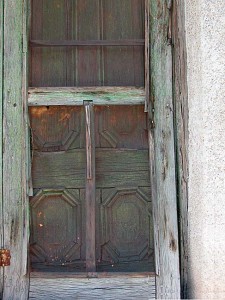Next week marks our one year anniversary from adopting our Doggy, a five year old black lab. Like our Big Guy reminded me tonight, we have more than four “people” in our family now!
As much as our Doggy has become a family member, we still haven’t figured out the best way to contain his double-daily-duties. Hubby is the scooper, but we needed a poop composter.
First I found one online, and was pretty much sold:
The
Doggy Dooley dog poop composter
is a small bin that you bury into the ground. You pop open the lid to put poop inside, which decomposes underground. There’s an enzyme product that you sprinkle into the bin to help with decomposition. It costs about $59.
Then I found the close to freebie option:
directions for making your own doggy composter!
Next I found a quick video:
Hubby dug the hole over the weekend, and with any luck we’ll have a successful and more sustainable system for doggy waste.
Do you have a doggy composter?
~*~*~*~*~*~
Sustainable Family Finances
The story of a family creating an abundant and sustainable life.
Author Archives: Darcy Cronin
Farmer Fresh
Nothing says summer more than a flat of Oregon strawberries. Add some blueberries on top of some vanilla ice cream, and you’ve got a simple and fabulous desert!
I’ve been to the farmer’s market twice this week on lunch breaks, and plan to go on Sunday too.
I’ll pick up a flat of strawberries and making my first-ever batch of strawberry jam! I agree with a fellow blogger from the Greenest Dollar who refuses to be intimidated by canning. Really it’s not rocket science, but it is more sustainable and will save you money.
I was definitely aghast to hear that
Safeway tried to host a
faux farmer’s market
– minus real local farmers! It’s enough to make me want to boycott Safeway, but since it’s the only grocery store I can walk to, I don’t think driving for last minute items would pay off for the environment or our pocketbook. But since I buy most of my produce through Spud’s organic delivery, I already avoid driving and buy almost all organic.
Do you support your local farmer’s market?
Do you find good prices and unbeatable freshness?
~*~*~*~*~*~
Sustainable Family Finances
The story of a family creating an abundant and sustainable life.
Frugal Family Camping
Now that summer is finally here it means camping season for our family.
Sleeping under a forest canopy or starlight sky is our way of connecting to nature and each other.
Plus, it’s inexpensive.
In reality most of our plans began months ago.
Here in Oregon most campgrounds are booked months in advance, and I typically set a reminder about nine months ahead to
reserve
our favorite sites.
There are plenty of first-come first-served campgrounds, but I’m just not willing to pack up the family on the chance that we’ll get a site. Plus, it gives us something to look forward to…
While scheduling can be tough with busy lives, camping with other families is really the way to go.
By joining forces you can share cooking/cleaning/kid watching duties and your kiddos have instant entertainment with friends.
But the real reason to camp with other families is the bond you’ll share, especially if it becomes a tradition. You simply get to know friends when you’re together for a few days rather than a few hours.
Perhaps you’re not a camper, and aren’t sure where to start.
Practice pitching your tent in your own backyard as a test run, your kids will get a kick out of it and you’ll feel more confident when you hit the road to the great unknown.
I love backpacking, but we are truly car-bound campers with
extra cargo
and kiddos.
Yet, I still strive for simplicity and don’t believe you need to buy a ton of gear to go camping. Here are a few random tips to consider for your next camping trip:
- Pack strategically – create camping bins to store kitchen stuff and gear/games. My Twin Sis just got me Modular Hauler as fantastic b-day gift, they seem really handy.
- Pack car strategically – pillows, toys, books by kids – fleeces/jackets in a bag – shoes under seats….when we road trip we have a “home” for everything, which saves you hassle.
- Have special games and books for camping and create your own ones, like fircone basketball 🙂
- Kids love special flashlights , especially the self-generated wind up ones
- Use flagging to demarcate camping area for younger kids – use “must be able to see you” rule
- Tents – bigger the better OR plan to use multiple as kids grow up
- Make/prep food in advance – my favorite is to make cornbread and then bring an easy chili mix – keep it simple with these camping meal ideas
- Give yourself a break if camping is too much with young kids – do it because it’s fun, not another “to-do” to make you feel guilty!
What are your favorite camping tips/tricks?
How do you save money while road-tripping?
~*~*~*~*~*~
Sustainable Family Finances
The story of a family creating an abundant and sustainable life.
Family Footprint
One of my goals has been to calculate our family’s carbon footprint. Having tinkered with them before expanding our household, I know how widely the results can vary. So, I initially committed to trying three calculators to compare results before settling on a footprint baseline to gauge progress.
First I tested the EPA calculator, which estimated that we emit 1,021 pounds per person (U.S. average is 20,750), for a family total of roughly 4 tons. Then Oregon DEQ calculator targeted our total family footprint at 35 tons which seems very high compared to other calculators!
Lastly, I plugged in our energy bill info and consumption estimates into the Carbon Footprint Calculator, which claims to be the most accurate available globally. It estimated a family footprint of 9.7 tons of carbon. Here are the details:
Your Carbon Footprint:
House – 0.14 metric tons of carbon
Flights – 2.82 metric tons of carbon (4x PDX to EWR per year to see Hubby’s family)
Car – 3.08 metric tons of carbon
Bus & Rail – 0.19 metric tons of carbon
Secondary – 3.47 metric tons of carbon
TOTAL: 9.70 metric tons
Carbon Comparison:
- Your carbon footprint is 9.70 metric tons per year
- The average footprint for people in the U.S. is 20.40 metric tons
- The average footprint in industrial nations is 11 metric tons
- The average worldwide carbon footprint is 4 metric tons
- The worldwide target to combat climate change is 2 metric tons
We have a long way to go to have a so-called carbon neutral footprint, but our daily efforts do add up to a comparatively smaller footprint. Yet, cutting our footprint by another half feels like a big goal.
Our effort to drive less and commute by transit cuts our transportation footprint by about half, we drive an average of 6,000 miles and the U.S. average is 12,000 miles for a total of 6+ tons. This could still be reduced, particularly by keeping our camping adventures closer to home.
More than the driving, it’s obvious that our annual trip to see Hubby’s family back East has a huge footprint, nearly a third of our impact. I paid to offset our last trip, but I not going to fool myself into thinking that this wipes away the pollution. You’re probably asking yourself, how could I have a goal of
traveling to Denmark
while working to reduce our family footprint?! Well the simple answer is that family matters, and I miss my “family” and friends so much that I can barely stand to wait another year to see them all. To keep our footprint in balance, I am committing to only making the trip once a decade no matter how dearly I miss my adopted homeland.
Have you calculated your family footprint?
Which calculator do this is most accurate?
~*~*~*~*~*~
Sustainable Family Finances
The story of a family creating an abundant and sustainable life.
Talking Priorities
Finding time to talk about your family’s financial priorities isn’t easy. Despite my best intentions, our “Money Honey” talks are still sporadic and briefer than I wish.
Yet, we happened to have two recent talks about our financial priorities.
Our first chat teetered on mushy. Perhaps I’m disclosing how mundane we are, but on a “date” night over a nice Italian meal our conversation wandered to a pretty lengthy chat about our long-term financial priorities and how we hope to reach our goals.
It may have been the red wine and puttanesca, but our talk was really gratifying.
It’s nice to put things into perspective and realize that we have already achieved our most meaningful life goals: adorable kiddos, meaningful careers and a beautiful home. Yes, they all require our constant investment, but the effort is paying off.
However, our second talk just one week later had quite a different tone. Hubby and I needed to discuss two home improvement projects that had each been researching, and coincidentally we both had bids in hand. Hubby wants a deluxe wooden screen/storm door, and I want energy-efficient window coverings to keep our home cooler in the summer heat.
We weren’t altogether argumentative, but it was clear that we each wanted dearly to convince the other that our project was the top priority.
The irony is that both improvement will make our home more comfortable and efficient, and we both want all the improvements made eventually. The heart of the matter is prioritizing our limited surplus income on the project that will have the most immediate benefit. The verdict is still out, but I sense a compromise on the way…
How do you talk about your priorities honestly and respectfully?
~*~*~*~*~*~
Sustainable Family Finances
The story of a family creating an abundant and sustainable life.




